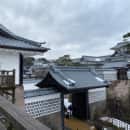An Incredible Japanese Learning Experience and Time in Japan May 03, 2025
By Elizabeth G (Japanese, Lewis & Clark College) - abroad from 08/21/2023 to 05/10/2024 with
CET Japan
I learned so much! This experience definitely improved my Japanese more than any learning had before, helped me learn so much about Japan, and it also expanded my horizons and helped me understand how different and similar cultures can be across the world. It also taught me that I can be totally fine living alone on the other side of the world, which was super great! It's a priceless experience for me for sure and one I will treasure the rest of my life.
Review Photos





Personal Information
| How much international exposure did you have prior to this program? | 2 weeks - 1 month |
Review Your Program
|
* Overall educational experience
Academic rigor, intensity, resources, etc. |
The academic rigor and intensity of the program is what I needed to significantly improve my Japanese skills over the course of two terms. Before going on the program I'd studied Japanese but had never been able to apply it. Therefore, the intense classes paired with being immersed in the language in Japan was an invaluable experience for my Japanese learning journey. Though it could be challenging at times, when I reached out I was able to receive support, and my Japanese learning abilities were strengthened like never before. |
|
* Host Country Program Administration
On-site administration of your program |
The CET staff were very accessible for consultation, and generally gave accurate and timely information to the students. Occasionally there were miscommunications between the staff and students, but those situations were usually resolved. I was impressed by the staff's willingness to help with connecting students to activities in Osaka and also Japan in general- If you expressed interest in certain areas to the staff, they would freely give information about and help with accessing activities related to that interest in ways that were not generally accessible to students (like setting up events with locals, etc.). |
|
* Housing:
How satisfied were you with your living arrangements? |
There were various types of housing available, which gave students a good variety of options in choosing how and where they wanted to live. Some facilities were nicer than others, which reminded me of the dorm hall system at most colleges. |
| * Food: |
Food is generally quite amazing, cheap, and readily available in Japan, so food and its quality was at no point a concern while I was there. Even fresh produce can be bought cheaply in the right places. I miss being able to buy milk at the convenience store around midnight if I needed to after having forgotten or being busy all day, or being able to take about five minutes to grab a snack to put in my bag before a day trip. |
|
* Social & Cultural Integration:
How integrated did you feel with the local culture? |
Since being integrated into the local culture of Japan is difficult for foreigners, even for those who are there more than 8 months (even years), I would say I felt pretty well integrated and was able to enjoy a lot of aspects of Japan that I wouldn't have otherwise. The program was well set up to help us meet people even outside the college. |
|
* Health Care:
How well were health issues addressed during the program? |
I found healthcare to be easily accessible and the program was very apt to assist and give information about a variety of services they had available. Although I didn't have any major health issues while there, I did use the talk therapy that was available over the phone, and was told that there was an in-person option as well if necessary. I got vaccinated for Japanese encephalitis before going, as recommended by my doctor, but it isn't absolutely necessary as far as I'm aware. |
| * Safety: |
I had no safety issues at any point. Osaka has the most crime in Japan overall, but it's really nothing compared to most of the U.S. I walked around a lot at night and while I'd still advise being careful I never felt unsafe. |
| If you could do it all over again would you choose the same program? |
Yes
I had a great time on the program and can't imagine it any other way. After talking with other people about their study abroad experiences, I think CET is particularly good at what they do, and their program suited what I wanted to get out of studying abroad, which was learning a lot of Japanese while also having fun. |
Finances
|
* Money: How easily were you able to live on a student's budget?
(1 = not very easy/$200+ on food & personal expenses/week, 2.5 = $100/week, 5 = very easily/minimal cost) |
There is a lot available in Japan for cheap whether it be food, activities, or transportation. Travelling long distances can of course get expensive, as shinkansen and airplane tickets are still not cheap, but there are busses as a cheaper option if you're willing to have the trip take a bit more time, and otherwise I'd recommend saving up and planning big trips carefully. |
| Do you have any general money-saving tips for future study abroad participants? | The CET staff sometimes have places they go or tips about where to buy products cheaper, and can help with advice on planning trips and other things, so I'd definitely recommend talking to them about saving money. Again, there are usually a variety of travel options, such as busses being a lot cheaper (though slower) than the more expensive options. At least for me, wandering out into the suburbs helped me find a lot of comparatively cheap places, like a drug store near my apartment that had a 6 pack of a nice brand of bar soap for like 2 dollars, as opposed to the 6 or 8 dollars I saw at other stores, that I would consistently go back and buy. In the same area there was also takoyaki for a lot less than at chain stores or in the urban part of Osaka. Though some shrines and temples charge for entry, that's mostly for places like Kyoto where they have some of the most famous buildings in the world, and visiting a shrine or temple can be a mostly free (except for transportation, and local trains are cheap) and fun Japan-specific activity. Japan is also very walkable and safe if you want to avoid transportation at certain points. |
Language
| * Did your program have a foreign language component? | Yes |
|
How much did the program encourage you to use the language?
0 = No encouragement, 5 = frequent encouragement to use the language |
The CET program has a Language Pledge which students sign to ensure they'll be using Japanese as much as possible, so encouragement to use Japanese frequently is the baseline of the program. Though the rules varied in each term I was there, it definitely encouraged me to use Japanese more than I would've otherwise. |
| How would you rate your language skills at the beginning of the program? | Beginner |
| How would you rate your language skills at the end of the program? | Intermediate |
| What was the highest level language course you had completed prior to departure? | A 200 level course. |
| How many hours per day did you use the language? | |
| Do you have any tips/advice on the best ways to practice the language for future study abroad participants? | Talk in Japanese with other study abroad students learning on the program as much as you can, and find Japanese people who are willing to talk to you and be patient as you do your best to talk to them. There are also a ton of online resources that you can practice Japanese with, even if it's just 15 minutes of vocabulary memorization per day. There's also watching Japanese media which will improve your skills if you pay attention to how they use the language. |
Other Program Information
|
* Where did you live?
Select all that apply |
|
|
* Who did you live with?
Select all that apply |
|
|
* Who did you take classes with?
Select all that apply |
|
| About how many local friends did you make that you will likely keep in touch with? |
A Look Back
| * What did you like most about the program? |
|
| * What could be improved? |
|
| * What do you know now that you wish you knew before going on this program? | To pack more lightly, and not bring stuff like school supplies and easily buyable non-essentials because it'll be a lot easier, cheaper, and even fun to buy those kind of things in Japan. You'll probably acquire quite a bit of stuff while in Japan, whether you buy it yourself or are given it, so it's good to have room in your suitcase. Also I wish I'd been more proficient in Japanese before going, but I'm glad I was able to learn a lot while I was there. |
Reasons For Studying Abroad
| To help future students find programs attended by like-minded individuals, please choose the profile that most closely represents you. |
The Academic or LinguistYou went abroad with specific academic goals in mind; the program credentials and rigor of your coursework abroad were very important to you. You had a great time abroad, but never lost sight of your studies and (if applicable) were diligent with your foreign language study. Good for you! |








